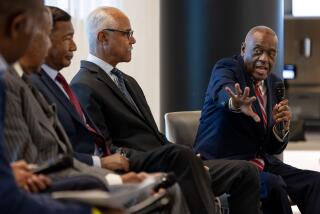Enlist GI Joe as a Black Role Model : Military: African-Americans’ unsung success story could be duplicated as a civilian alternative to the streets.
- Share via
When Army Gen. Colin Powell became chairman of the Joint Chiefs of Staff in 1989, he reached a level of responsibility no black man had ever achieved before.
Beyond this personal victory, however, was an institutional triumph. The military system, opened to Colin Powell when few others were, paved his way to the top echelons of national and international power. His accomplishment illustrates dramatically the impact of the military on African-American families.
Postwar conditions have had the combined effect of increasing both the numbers and the upward mobility of African-Americans in the military. This, in turn, has had a disruptive effect on African-American families by separating large numbers of the most able youth from their families. At the same time it has helped to provide a strengthening feature to these families by creating meaningful, high-status employment with educational and career inducements, which have enabled these military personnel to do well both in the service and in civilian life afterward and thus provide for stability and upward mobility beneficial to African-American family life.
Charles C. Moskos, a military sociologist, has characterized the role of blacks in the military as a modern success story not generally appreciated by other sociologists, black leadership or the public at large: “Blacks occupy more management positions in the military than they do in business, education, journalism, government, or any other significant sector of American society. The armed forces still have racial problems,” he observed, “but these are minimal compared with the problems that exist in other institutions, public and private.”
More important still, the armed forces have become attractive job and career options for hundreds of thousands of young African-American high school graduates because of the dismal employment prospects for them since the early 1970s. Were it not for the military, many of these young men would be unemployed. Large numbers would hang out on street corners, get into trouble, and end up in that other major system. Even now, for those who are not able to finish high school or complete a high school equivalency program, the military is not an option and the streets are the major alternative.
When a young black high school graduate can enter the Army with an annual salary of $7,668 plus room, board, medical care, pension and other benefits that may include a re-enlistment bonus as high as $8,000, it becomes an attractive alternative to unemployment in civilian life.
What is not generally appreciated is that when blacks do return from the military, they do so at relatively young ages, in relatively favorable economic circumstances, with well-developed skills, and thus add to the black community a stable, self-sufficient element in the growing black middle class.
What further sets the military apart from many civilian institutions is that the military seems to be aware of its limitations on equality of opportunity, willing to face them honestly and is genuinely committed to further improvements. What is also clear is that the African-American community, its leadership, its families and individuals have a strong receptivity to the armed forces.
Moreover, the history of blacks in the military suggests that it is indeed responsive to civilian pressure and even civilian policy recommendations. This was reflected in the desegregation of the armed services and in the increase in black enlisted personnel. All of this gives to the African-American community and leadership substantial potential for influencing the direction of the military.
The military experience suggests that there are ways and means of developing a comparable civilian service system--just as attractive and glamorous, just as filled with danger, discipline, status and value as the military system--so that young adults have an alternative to enlisting in the military. The Job Corps, a partnership between government and industry, has already demonstrated the potential for preparing low-income young men and women for jobs, educational advancement and life skills. Planning for transition should not be left to the military alone. There is a role for every sector concerned about black families.
More to Read
Get the L.A. Times Politics newsletter
Deeply reported insights into legislation, politics and policy from Sacramento, Washington and beyond. In your inbox twice per week.
You may occasionally receive promotional content from the Los Angeles Times.










